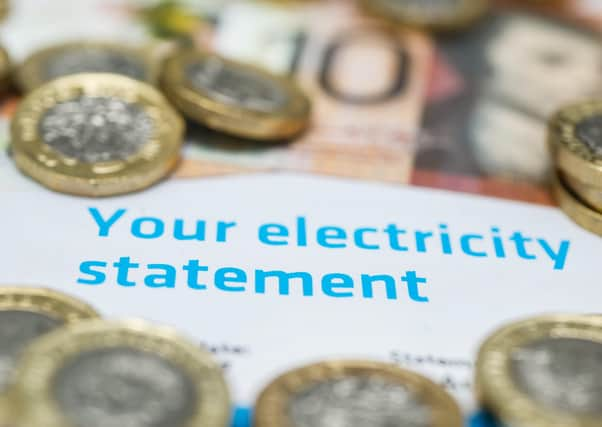Covid-19 raises energy firms’ temperature


The one silver lining in this miasma of bad news is that the slump at the sumps feeds into the price we pay for gas and electricity too. It’s one of the prime reasons that we’re now seeing the cheapest prices for switchers in three years – huge savings are possible right now. And this isn’t just about tiddler firms, it’s about the big six well-known names who are pumping out cheap prices too.
Don’t rely on the price cap, it’s not cheaper
The majority of UK homes are on tariffs at or near the price cap. This gives you a false sense of security. That price is capped at £100s a year more than the cheapest tariffs. If you’re on the cap, by definition you’re paying the maximum allowed for standard tariffs.
Advertisement
Hide AdAdvertisement
Hide AdMore so, the price cap only moves every six months, so it hasn’t factored in the recent drop in the oil price. For someone with typical use the cap is currently £1,127/year (use more and your cap is higher, use less and it’s lower), while the cheapest deals are less than £800/yr.
That’s why everyone should check their tariff and take advantage of historically low oil prices.
It’s fine to say switch now, but if I do won’t they just put the prices up?
No one knows what will happen to the market going forward. We thought Brexit caused uncertainty, coronavirus makes that look like child’s play. That’s why I would suggest you look at getting a fixed tariff. That way, the rate you pay is locked in, for at least a year – what you actually pay depends on usage – but by locking in you get today’s historically cheap rates.
Of course, that’s not to say things can’t get even cheaper, that’s always possible, but most people are paying so much more than needed, the impact of locking in at these prices if things do get cheaper, is for most trivial compared to not doing anything and paying massively over the odds.
How cheap do these cheap fixed tariffs go?
As I mentioned, the typical big six standard tariff is within a pound of the £1,127/year price cap for someone with typical usage. Yet, for the same usage the new cheapest 1yr fix is £774/yr on average, that’s £350/yr cheaper with Green Network Energy. Other fixes that will typically save people on standard tariffs over £300 include Tonik Energy, British Gas, Avro, EDF and E.on – just to show you the range.
Though it’s important to note many of these tariffs are for new customers only, not existing. Yet don’t worry, if you were with EDF and wanted to stick with a big name, there’s Eon or British Gas to choose from, or vice versa. There are so many cheap deals you’ve lots of choice.
To find your cheapest, do a comparison
Exactly who your winner is depends on your usage and where you live, as prices vary regionally. So, to find your cheapest tariff use a comparison site – plug in your details and it calculates your exact winner and saving.
Advertisement
Hide AdAdvertisement
Hide AdYou can use my www.cheapenergyclub.co.uk (which also gives £25 dual fuel cashback you don’t get direct) or go to any www.ofgem.gov.uk approved comparison site.
This is important as some of the cheapest tariffs – especially the super-cheap ones from the big six providers like British Gas, for example, are only available via comparison sites. You can’t just call it up and ask for it. This also gives you the advantage of seeing how the deal stacks up for you.
Though beware, as comparison sites are allowed to only show you tariffs that pay them, which means you may not see all the deals (for the sake of transparency my Cheap Energy Club always defaults to showing all the deals).
And it is worth noting that these comparison sites don’t apply for Northern Ireland as it has different tariffs, there you’ll need the www.consumercouncil.org.uk tool.
Not sure of your details, don’t let that stop you
Even if you just know your existing provider’s name you can do it. Of course, it’ll be more accurate if you have your tariff details and can plug your usage in too. Yet if you’ve not switched in years, you’re almost certainly on an expensive standard tariff, and overall the sin of inaction is usually bigger than the sin of inaccuracy – so if you don’t know, the comparison site will estimate it for you. This will only take you a few minutes. Then it’s switched over in 17 days.
And if you’re worried about the practicalities of switching, other than who is billing you and service, very little changes. It’s the same pipes, gas, meter, safety – you don’t lose supply – the only difference is price and customer service. And no one needs to visit right now. The only time that’ll happen is if you need a smart meter fitted, as some cheap tariffs require you to have one, but you can still get those tariffs now and they’ll only come and fit them once it’s safe to do so after lockdown.
Those on prepayment meters can save too – but not as much
If you pay by a key or card meter, as many of the country’s poorest and most vulnerable do, then, outrageously, there’s nowhere near as much competition, and you pay more – though prices have been capped, which has helped a touch. If you do a comparison there are often savings to be made, but often less than £100.
Martin Lewis is the Founder of MoneySavingExpert.com. To join the 13 million people who get his free Money Tips weekly email, go to www.moneysavingexpert.com/latesttip
Comments
Want to join the conversation? Please or to comment on this article.